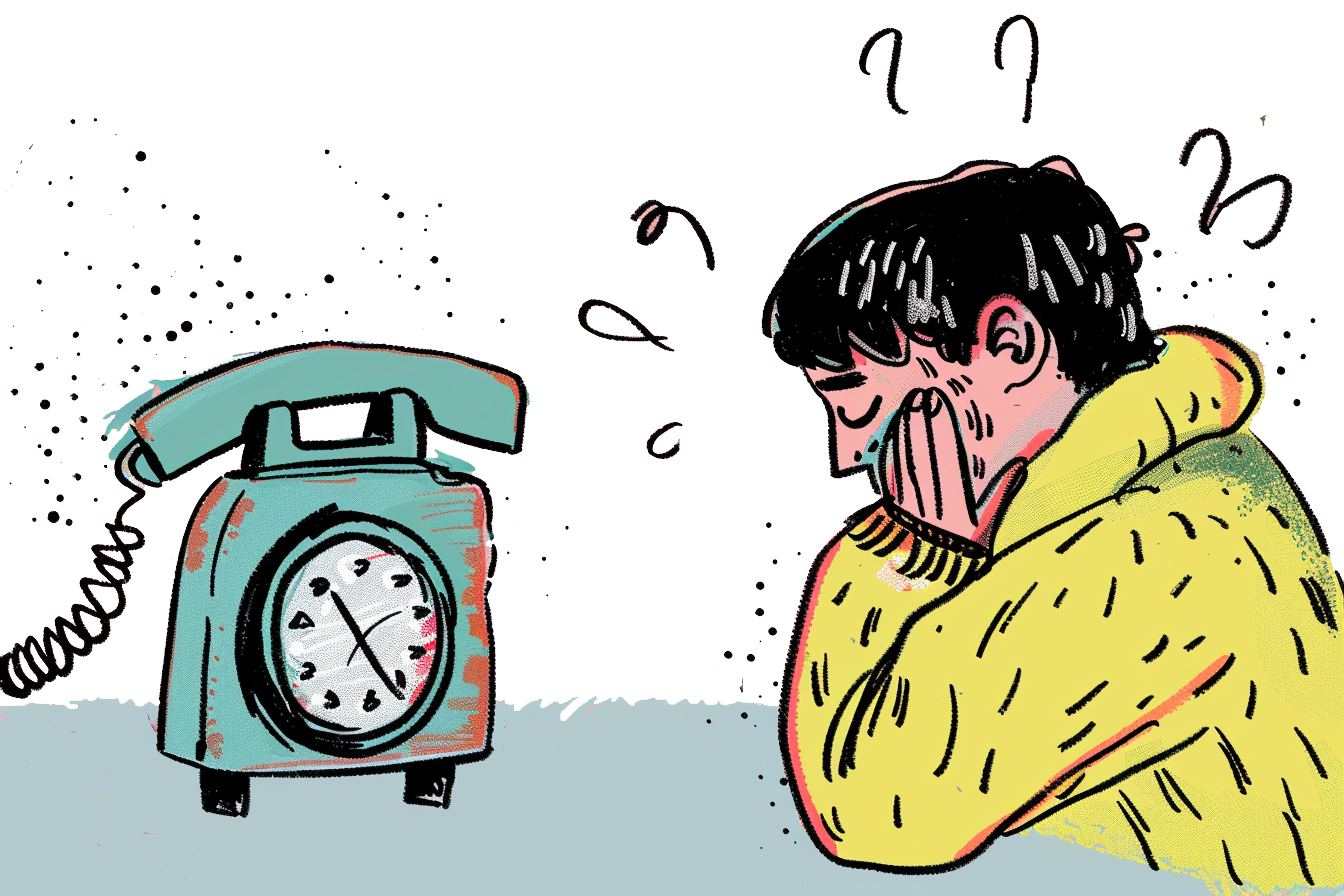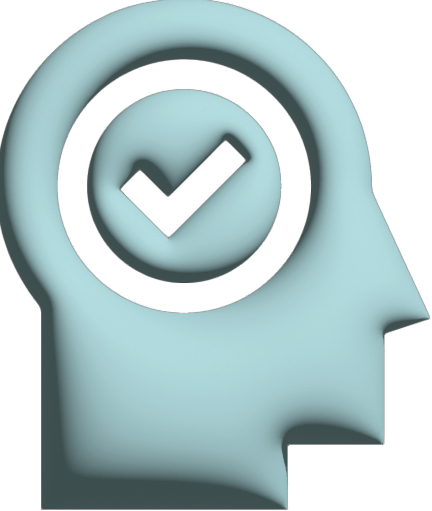

Are you rushing work through just before the deadline, and making careless mistakes along the way?
Are you struggling to focus on tasks in your job or at home?
Do you constantly feel restless, and find it hard to relax?
Is losing and misplacing your phone or your keys causing you to be late for your engagements?
If so, perhaps you should consider an ADHD assessment.

Many individuals face long wait times for ADHD assessments and treatment. These delays can have significant consequences, including increased stress, impaired academic or work performance, and strained relationships. Early diagnosis and intervention are crucial for managing ADHD effectively and minimizing its impact on daily life.
Attention Deficit Hyperactivity Disorder or ADHD is a common mental health problem that is thought to affect around 4% of people in the UK1. Symptoms begin in early childhood, but can often be missed or masked, leading to difficulties in adult life. Over 80% of people living with ADHD are undiagnosed, accounting for around 2 million people in the UK 2.
The impacts of ADHD can sometimes be dismissed as minor. However, untreated, this condition is associated with higher rates of obesity, poorer educational performance, and low self-esteem.3
Fortunately, there is an increasing awareness of this disorder in our society, leading to many more people seeking assessment and treatment. But this has also led to an increased demand on services, with some parts of the country experiencing 10 year waiting lists for assessments.4
This is particularly frustrating when highly effective treatments exist for ADHD, with response rates of around 70% 5. The team at Eton Psychiatrists want to be part of the solution of lowering wait times for individuals, as well as being able to deliver effective treatments promptly, to those that need it.
ADHD symptoms have been recognised and described in literature from around the world for more than 200 years. In the 1790’s Dr Crichton, a Scottish doctor, first recorded a description of symptoms such as poor focus, and children who were more easily distractible than peers. But it wasn’t until 1902, when Sir George Still gave a series of lectures and case reports that the modern diagnostic criteria for ADHD began to develop. He described 15 boys and 5 girls of normal IQ who were impulsive, unable to concentrate, and lacked self-control.
In 1937, Dr Bradley first used stimulants in children to improve academic performance for those with hyperactivity. Methylphenidate (also known as Ritalin and Concerta) became available in 1944. It is now recognised that ADHD can present with symptoms of hyperactivity, inattention, or a combination of the two.
The cause of ADHD is not known. However, neuroimaging studies have shown that there are differences in the brains of children with ADHD, compared to their peers. These differences are seen in children as young three. This strongly implies either genetic causes, or factors in pregnancy, and very early life, which may cause the condition.
ADHD has been shown to be associated with:


Your journey for an ADHD assessment with Eton Psychiatrists starts here! If you want to proceed with an assessment, or if you want more information before deciding, contact our dedicated team of medical secretaries and clinicians at info@etonpsychiatrists.co.uk or 020 4586 8616
We will aim to respond to your query within 72 hours by email. If you have an urgent query, please do not hesitate to call us. If the query is of a clinical nature, we will contact one of our dedicated psychiatrists to ensure that all your questions are answered promptly, and in full.
If you then decide to proceed with an assessment, we will then ask you for some information, to help your psychiatrist prepare for your appointment.

Your psychiatrist will want to know a little bit about you, and the symptoms that you have been experiencing, in order for the assessment to be focused on your difficulties.
We will send a small number of brief questionnaires that evaluate the presence of different ADHD symptoms, as well as symptoms of anxiety and depression.
It is also helpful to hear from those close to you, about any ADHD symptoms that you have experienced. We will ask for someone who has known you well for at least the last 6 months to complete a brief questionnaire; this could be a friend, flatmate, spouse or other relative.
We will also ask for a questionnaire to be filled in by someone who had parental responsibility for you from the ages of 5 – 12. If you have any difficulties in finding the right people, don’t worry just let us know!
With your permission, we will also write to your GP / ask you to provide us with a summary of your medical history, as well as completing our registration form and providing us with a form of ID.
This might sound like a lot to do! We keep our questionnaires as brief as possible, and our team will provide you with clear information on how to complete the pre-assessment forms. They should take around 1 hour to complete in total.
Whilst you are completing your onboarding, let the team know about your availability for an assessment, whether you would like to have the assessment remotely, or face to face, and if you have a preference for a particular psychiatrist that you would like to see. We aim to offer assessments within 2 weeks of your enquiry.
You are now ready for your assessment! One of our team will provide you with an appointment link, or directions to our Harley Street clinic. Please do not hesitate to contact us if you have any further questions leading up to your appointment!

At Eton Psychiatrists, we offer 2 types of assessment: a diagnostic assessment, lasting 60-90 minutes, and a diagnostic assessment with treatment discussion that will last between 90-120 minutes. If you choose this assessment, your psychiatrist will perform a full diagnostic assessment and will also discuss treatment with you, if a diagnosis of ADHD is made.
Prior to your appointment, your psychiatrist will have reviewed all your pre-assessment information, and will spend some time in the assessment getting to know you better. Your psychiatrist will ask you questions about any current symptoms of ADHD, and how they might be impacting upon your work, your study, or your home life. They will also enquire about these symptoms in childhood, and other aspects of your background, such as your education, employment, relationships, and medical history.
All of this will allow your psychiatrist to deliver a comprehensive ADHD assessment, meeting or exceeding NICE guidelines. In the large majority of cases, your psychiatrist will be able to come to a conclusion as to the diagnosis in the assessment. Occasionally, more information will be required. If this is the case, this will be clearly explained to you and a further feedback appointment will be offered free of charge to discuss the diagnosis, once any further information has been reviewed.
If a diagnosis of ADHD is made, your psychiatrist will outline to you some guidance as to next steps. If you chose to have the treatment discussion appointment, then your psychiatrist will spend the rest of the appointment taking you through, in detail, the various options for treating ADHD, and answering any questions that you may have along the way. This will include information about lifestyle changes, psychological therapy, stimulant and non-stimulant medication.
If a diagnosis of ADHD is not made, then do not worry, we will refund you the difference!

At Eton Psychiatrists, we offer 2 types of assessment: a diagnostic assessment, lasting 60-90 minutes, and a diagnostic assessment with treatment discussion that will last between 90-120 minutes. If you choose this assessment, your psychiatrist will perform a full diagnostic assessment. If a diagnosis of ADHD is made, and you later decide that you want to trial medication, you will require an additional 30-minute appointment to discuss treatment options with you in detail.
Prior to your appointment, your psychiatrist will have reviewed all your pre-assessment information and will spend some time getting to know you better. Your psychiatrist will ask you questions about any current symptoms of ADHD, and how they might be impacting your work, your study, or your home life. They will also enquire about these symptoms in childhood, and other aspects of your background, such as your education, employment, relationships, and medical history.
All of this will allow your psychiatrist to deliver a comprehensive ADHD assessment, meeting or exceeding NICE guidelines. In the large majority of cases, your psychiatrist will be able to come to a conclusion as to the diagnosis in the assessment. Occasionally, more information will be required. If this is the case, this will be clearly explained to you, and a further feedback appointment will be offered free of charge to discuss the diagnosis, once any further information has been reviewed.
If a diagnosis of ADHD is made, your psychiatrist will outline some guidance as to the next steps. However, an additional appointment would be required in order to discuss treatment options in more detail.

At Eton Psychiatrists, we pride ourselves on our high level of post-diagnostic support. We think that it is important to go further than other clinics and provide you with detailed information about your diagnosis, curated useful resources, and detailed information on treatment options and lifestyle advice. This will be provided to you electronically and as a complement to any discussion that you may have with your psychiatrist about treatment options. This information pack will be personalized for your individual needs.
Your psychiatrist will then start work on your detailed assessment report, which will be delivered to you within 2 weeks of your appointment. If you require proof of diagnosis more urgently, a brief letter will be provided to you within 48 hours. Please carefully read your report, and let one of our team know if you want to request any amendments.
At any point after your diagnosis, if you decide that you would like to pursue treatment for your ADHD, let one of our team know and we will enter you into the treatment pathway. If you have any further queries about your report or diagnosis, then please do not hesitate to contact us!

If you chose the 60-90 minute diagnostic appointment, and later decide on entering the treatment pathway, you will need to meet with your psychiatrist for another appointment.
They will take you through, in detail, the various options for treating ADHD, answering any questions that you may have along the way. This will include information about lifestyle changes, psychological therapy, and stimulant and non-stimulant medication.


If your assessment was conducted by one of our team at Eton Psychiatrists in a 90-120 minute assessment and treatment discussion appointment, you will be almost ready to begin treatment for ADHD.
If your assessment was conducted in a 60-90 minute diagnostic appointment, then you will need to meet with your psychiatrist for a 30-minute appointment to discuss treatment options. They will take you through, in detail, the various options for treating ADHD, answering any questions that you may have along the way. This will include information about lifestyle changes, psychological therapy, and stimulant and non-stimulant medication. You are now almost ready to begin treatment for ADHD!

If you have been previously diagnosed with ADHD and would like to start treatment at our clinic, we will be very happy to help you on your journey!
You will need to provide us with your diagnostic report, which should include detailed information about your assessment, medical, and psychiatric history. Additionally, we will ask you to complete our registration form and provide some ID. With your permission, we will also write to your GP, asking them to provide us with a brief summary of your medical history.
Your psychiatrist will review this information to prepare themselves for the treatment initiation appointment. Your clinician will spend 45-60 minutes asking you for an update on your progress, and medical and psychiatric history since the time of your ADHD assessment.
After this, they will take you through, in detail, the various options for treating ADHD, answering any questions that you may have along the way. This will include information about lifestyle changes, psychological therapy, and stimulant and non-stimulant medication. You are now almost ready to begin treatment for ADHD!

Prior to starting treatment for ADHD, you will need to provide us with a recent recording of your vital signs, which include your blood pressure, pulse rate, height, and weight. We generally recommend attending your local pharmacy for these tests. Alternatively, you can do this yourself if you have the necessary equipment at home.
Your psychiatrist may also request a physical examination and, in rare cases, the opinion of a cardiologist before prescribing medication.
At Eton Psychiatrists, we work with a pharmacy, but you may choose a local pharmacy. Please provide the name and address of the pharmacy. Your psychiatrist will then post your prescription to the pharmacy. If you’ve chosen a local pharmacy, you will receive a Royal Mail tracking number to check the delivery progress.
Once you have received your medication, you are ready to start your titration as directed by your psychiatrist!

Your psychiatrist will give you specific guidance on the optimum time to book your follow-up appointment, so that a thorough review of your response to medication can take place and ensure that you have enough medication remaining, preventing your prescription from running out.
Please provide your psychiatrist with a repeat set of vital signs (blood pressure, pulse, and weight). The ideal time to do this is in the week preceding your follow-up appointment.
In these appointments, your psychiatrist will carefully review the beneficial effects, any side effects of the medication, and your vital signs. You will then collaborate on a plan for the next phase of your medication titration. This could include further increasing the dose of a medication or using an alternative medication. You will then be provided with a further prescription and guidance on when to book your next follow-up appointment.
We suggest that follow-up appointments be conducted every 4 weeks while you are being titrated on the medication, although at Eton Psychiatrists, we are also flexible to any other needs you may have. The large majority of our patients who respond to medication will require 3-4 follow-up appointments before a stable dose is achieved.
We strongly advise booking follow-up appointments as soon as you have received your prescription to avoid any delay or disappointment.

Once you and your psychiatrist are satisfied that your medication is optimized, your psychiatrist will seek to enter into a Shared Care Agreement (SCA) with your GP. SCAs are agreements between your psychiatrist and GP to share responsibility for your care. Typically, your GP will check your vital signs (blood pressure, pulse, and weight) every 6 months, and your psychiatrist will review your mental health in a yearly appointment lasting 20-30 minutes. The key difference for you is that your prescription will be provided by the NHS, saving you money on private prescription costs.
Our psychiatrists follow NICE guidelines and will do everything they can to ensure an SCA is reached with your GP. However, not all GPs will accept SCAs with the private sector. If your SCA is refused, although disappointing, do not worry! We will ensure that you continue to receive your prescription in the private sector, and otherwise, your care will remain as if you were on an SCA, with 6-monthly reviews of your vital signs free of charge and a once-yearly 20-30 minute review appointment with your psychiatrist.
If you have any queries about your medication between these appointments, or if you require an additional review for any reason, do not hesitate to contact us!



